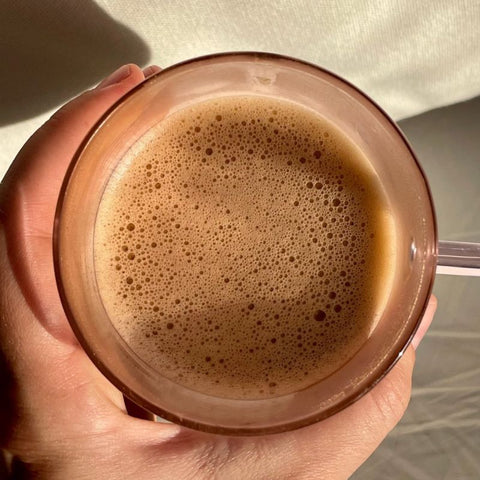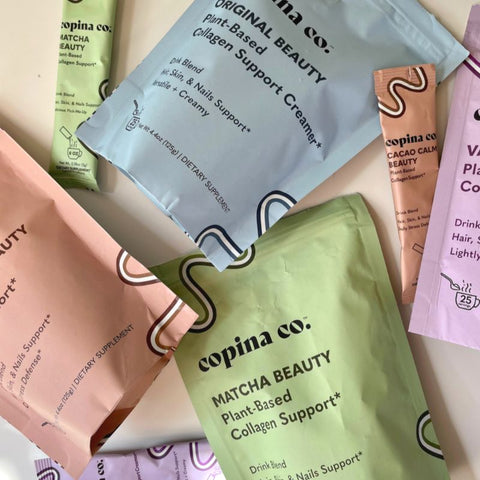We’re all trying to be the best versions of ourselves, but are you actually making matters worse? Here are 4 wellness mistakes you might be making that are potentially hurting your skin and your health.
- Too much sugar can cause acne, dry skin, bloating
Sugar is an inflammatory food, meaning it causes blood sugar levels to rise and increases inflammation levels in the body. Skin conditions like eczema, psoriasis, and hormonal acne can be triggered or worsened by an increase in inflammation from too much sugar.*
One of the most damaging effects of having too much sugar in your diet is that it can make your skin look prematurely aged. Sugar has been shown to break down elastin and collagen, which are proteins that give the skin shape, structure, and firmness. When these proteins break down, you’re more likely to experience fine lines, dryness, and dull skin.*
Additionally, eating too much sugar can increase the risk of breakouts and acne. The increase in inflammation caused by excess sugar can lead your skin to produce more sebum (a type of oil), which then leads to congested pores and even painful cystic acne.*
Sugar can also wreak havoc on your digestive system. Consuming too much sugar can cause bloating, as sugar can draw water into your large intestine and slow digestion.* Excess sugar that is not absorbed by the body can remain in the bowels, where it feeds bad bacteria and yeast, which can cause a buildup of gas, causing cramps, bloating, and potentially pain.*
We recommend paying attention to how much sugar is in snacks like dried fruit, cereals, granola, yogurt, and even plant milk. Products like coconut sugar, maple syrup and honey may be natural forms of sugar, but still contain large amounts of sugar and are best consumed mindfully and in moderation. Fortunately for you, all Copina Co. blends have 0g added sugar and are made with monkfruit powder.

- Gums and oils can cause gastrointestinal distress and are high in calories but low in nutritional value
While having an abundance of non-dairy alternatives to choose from is amazing, it’s still important to read the labels and make a smart choice when it comes to plant milk. Many plant milks (oat, almond, soy, coconut, etc) contain added gums and oils that act as emulsifying agents. These emulsifiers give texture and smoothness to the milk to make it more pleasant to drink. Ingredients like xantham gum, guar gum, carrageenan, gellan gum, canola oil, palm oil, and rapeseed oil are often added to plant milks to improve texture. Oils drive up the calorie count and can be inflammatory, but don’t improve the nutritional value of the product. Most gums are made from byproducts of other food production or from bacterial fermentation. These gums have been shown to cause gastrointestinal distress, including bloating, indigestion, and more.* This is why we made all Copina Co. blends free of gums, emulsifiers, and seed oils.
It’s in your tummy’s best interest to check the label on your plant milk next time you hit the grocery store and look for an option that has as few ingredients as possible- preferably just the base ingredient (almonds, oats, etc), water, and maybe a bit of natural sweetener. Need a suggestion? Try Elmhurst, Malk, Good Mylk Co., Taché, or New Barn Organics. Or, try making your own plant milk at home, it’s easier than you think!
- Dairy can contribute to breakouts and gut issues, especially if you have a sensitivity
While we don’t believe in a one-size-fits-all approach to health to encourage anyone to exclude specific food groups, we do think it’s important to what types of foods make you feel your best. When it comes dairy, many people struggle to include it in their diet without adverse effects. Bloating, poor digestion, and breakouts have all been linked to consuming dairy products.*
Milk naturally contains certain hormones that have been shown to increase sebum (an oil in the skin) production, which can block pores and lead to acne. Additionally, many dairy cows in the US are treated with a synthetic hormone called recombinant bovine growth hormone (rBGH) to increase milk production. These cows often have more of the hormones present that worsen acne.
Do you have a friend that just *can’t* put down the ice cream, no matter how much their stomach hurts after? Milk contains proteins including whey and casein, as well as lactose, which is a sugar found in milk. Many people are lactose intolerant, meaning their bodies can’t digest the lactose, which causes gastrointestinal distress. Similarly, whey and casein can be difficult to digest due to their high protein content which can also lead to gas and bloating, and contribute to acne breakouts.
So, if you’re someone who has struggled to digest dairy in the past or are looking for a way to improve breakout and think dairy might be a culprit, try cutting it out for 2 weeks to see if you notice any improvement. You can also try some of our Copina Co. creamers and drink blends, all of which are dairy-free.
- Pesticides can be harmful to your health and the environment.
Do you pay attention to whether or not the products you purchase are tested for pesticides? High quality Japanese matcha products like Copina Co.’s own Matcha Plant-Based Collagen Boost are tested for pesticides, but not all companies take this step. We recommend asking the company supplying your matcha whether or not they test for pesticides before buying.

Matcha in particular is an ingredient that should be examined for quality. With its recent surge in popularity in the US and Europe, more matcha has entered the market than ever before. However, high-quality matcha is often a bit expensive, so some producers look to cut corners on quality to lower the price, especially when matcha is used as an ingredient to flavor a food or drink item instead of being sold as a pure powder.
Matcha is a type of green tea that is traditionally shade-grown in Japan to increase the chlorophyll content of the leaves, resulting in a bright green color and unique flavor profile. High quality matcha will be vibrant green in color and have a rich, earthy taste that is slightly bitter and floral due to its rich chlorophyll content. It will be very high in caffeine, l-theanine, vitamins, and amino acids. However, during the growing process, some farmers spray their matcha crop with pesticides (a chemical compound) to protect it from unwanted insects, weeds, and fungi.
Pesticides have been shown to be harmful and are linked to cancer, reproductive issues, endocrine disruption, kidney and liver damage, and are incredibly harmful to the environment.* Due to their ability to kill and control other living organisms, pesticides are potentially toxic when consumed. Don’t worry- there’s a simple solution to make sure you’re not consuming unwanted pesticides in your matcha or other superfood powders. You should feel confident in asking companies you purchase from if they test for pesticides and whether or not their products are pesticide-free. Copina Co.’s Plant-Based Collagen Boost Blends, including ourt matcha blend, are all lab-tested and verified as pesticide-free, so you can feel good about what you’re putting in your morning latte.
Are you making any of these four wellness mistakes? Now you’re fully informed to make any necessary changes to your routine so you can get back to feeling like your best self asap!










